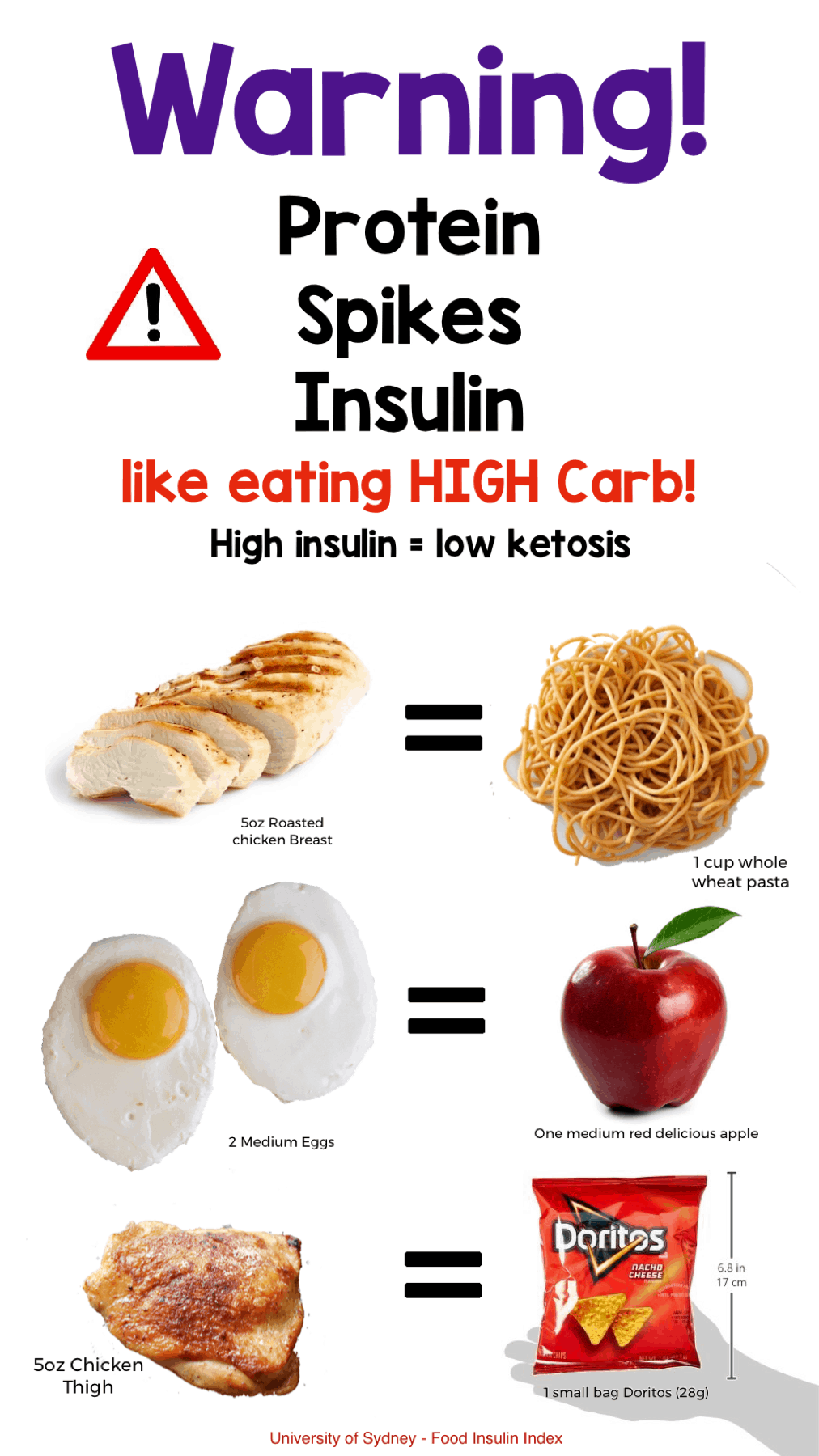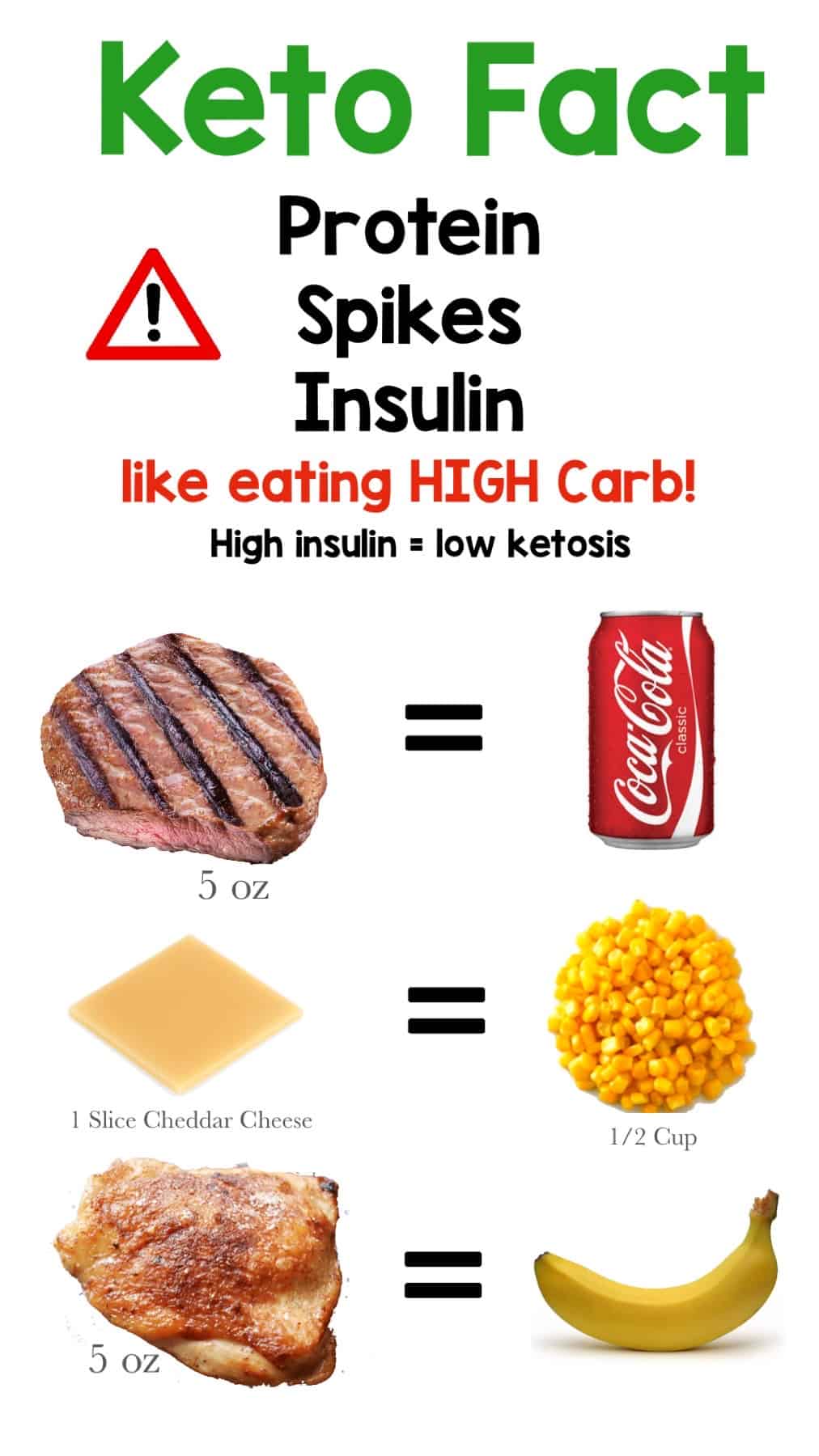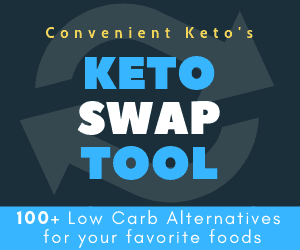When discussing food, we tend to break things down into three macronutrients: carbohydrates, fat, and protein.
On the keto diet, if you keep your carbohydrate intake as low you can and your fat intake as high as you can, you tend to convert body fat into ketones for energy.
Simple enough.
However, that leaves the oft-overlooked macronutrient, protein. Ask around and no one, not even the experts, can agree on what level of protein on keto is optimal for your body. Guidelines for keto protein intake generally gloss over the topic with such vagaries as “moderate” or “sufficient” amounts of protein.
Why should I care about protein on keto?
When people slash carbs and increase fat intake to achieve a ketogenic diet, the natural tendency is to increase protein intake as well. Just think about extremely popular keto fat sources like beef, chicken, bacon, eggs, etc. They certainly contain the fat that is coveted on keto, but they also contain a relatively significant proportion of protein.
If you haven’t already realized it, high meat consumption is a hallmark of Western diets, with the majority of people easily exceeding the Recommended Dietary Allowance (RDA) for protein. Add keto to the mix and you get a free license to consume EVEN MORE meat. And, to be clear, it’s not just meat– protein is in many low carb foods that aren’t always abundantly apparent, such as cheese, nuts, seeds and soybeans.
But wait, what’s wrong with high protein intake?
It’s complicated.
Protein is essential for living. At the same time, it’s almost impossible to eat too little protein if you consume a sufficient calorie diet. Protein malnutrition generally only affects people in developing nations that are malnourished overall.
In the developed world, everywhere you look, people are trying to add MORE protein to their diets. You’ll notice that diet food products play to this preference by pumping in protein at every chance, sometimes unnecessarily, to make their products more appealing to dieters.
So, at first glance, it’d seem that it’s actually BETTER to consume more protein.
However, the less obvious downstream effects of excess protein consumption are what can potentially be detrimental long-term.
Read on if…
This post isn’t meant to be anti-protein propaganda, but instead a call to awareness for increased longevity and well-being.
If you’re losing weight and feeling great on keto and you’re not concerned about minimizing long-term health risks and extending your “health-span” then you really don’t have to read any further. Seriously, we love you for reading our blog, but you probably won’t get much out of the rest of the article.
If you’re still with us, what exactly are the potentially detrimental effects of excessive protein consumption? Let’s start with a big one: inflammation.
Inflammation from eating too much protein
When you ingest most types of protein, your body makes a molecule called Insulin-like Growth Factor-1 (IGF-1), one of the main biomarkers for increased inflammation in the body. Inflammation isn’t just a vague term related to pain. Increased inflammation leads to increased risk of diseases like cancer and gout (among other things). 1 Essentially, you’re putting yourself at higher risk for disease and potentially reducing your lifespan by eating too much protein.
A real-world example of the effects of IGF-1 is best shown in the Laron people of Equador. This isolated population contains a mutation in their body’s receptors for IGF-1, meaning the body can’t utilize IGF-1 for growth. Unsurprisingly, the population is marked with dwarfism.
But, what is fascinating is that they also have essentially no incidences of metabolic diseases like diabetes and cancer!2 Basically, IGF-1’s affect on the body leads to growth and excess IGF-1 can lead to the development of metabolic diseases.
Of course, high-glycemic carbs will also increase IGF-1 levels3, so a low glycemic, low carb ketogenic diet also helps keep inflammation low. It’s just that the natural inclination for keto dieters is to increase protein intake, which may negate some of the benefit of restricting your carb intake.
What level of IGF-1 is ideal?
If you are above 175 ng/mL range for IGF-1, you could afford to eat less protein in your diet. Optimally, experts consider an IGF-1 level of around 140 ng/mL to be more protective for your health.
You don’t have to take the internet’s word for it either. Instead, you can get a quick, relatively inexpensive blood test to determine your IGF-1 levels.
Pro-Tip: You can even get a kit mailed to your home. Check out the HealthLabs.com’s IGF-1 Test here (our affiliate link)
Protein causes a delayed blood glucose response
Let’s say you eat a low carb meal with high protein. Let’s also say you measure your blood glucose levels after the meal.
It turns out, you probably won’t notice any abnormal blood glucose spikes in this scenario. So, you think: “Awesome! High protein doesn’t have a real effect on your blood glucose.”
However, protein’s effect on blood glucose is delayed, and usually by quite a while. In fact, studies have shown that you will see a delayed blood glucose peak around 3 to 5 hours post-meal and in an amount equal to around 20% of the ingested protein by weight4. That means if you eat a higher protein dinner, you might experience a blood glucose spike later at night when you brush your teeth* or even during sleep!
In fact, common advice given to diabetic patients is to snack on protein before bedtime because the delayed release of glucose will keep blood glucose levels from dropping too low during he night5.
However, increases in blood glucose levels come with a corresponding increase in insulin, which inhibits the creation of ketones.
Protein Increases Insulin Levels
When you digest a juicy steak, the digested protein stimulates the release of insulin. This process is necessary to allow the protein to be utilized by the body, which is great! However, insulin also directly inhibits ketone generation.6 Put another way: You need protein to live, but protein’s tendency to spike insulin will also directly hinder your efforts towards optimal ketosis.
On keto, you might be losing weight, but the benefits of ketosis, like improved cognitive function and energy, are diminished. Plus, depending on how much protein you consume, you might hit a weight-loss stall.
Additionally, huge spikes in insulin, even without a corresponding blood glucose spike, can contribute to developing insulin-related diseases like diabetes7. We’ve seen plenty of examples of people on high protein (read: high insulin) Carnivore diets touting their great cholesterol test results on Instagram, while simultaneously rocking pre-diabetic fasting blood glucose levels.
The Food Insulin Index
So, now we’ve established that excessive insulin hinders ketogenesis and can lead to disease. So, just how much does protein affect insulin?
The Food Insulin Index (FII) was developed for diabetics to better help dose insulin shots. The FII takes into account protein-heavy foods and compares them to familiar carb sources. When we first saw this data8, we were literally shocked. Check out these sobering examples.


The infographics speak for themselves, but the point is: foods people eat all the time on keto impact insulin levels as much as carb-heavy snacks the same people would never dare touch.
But, @#$!&^%!@#%*!??
Yes, this is crazy stuff. You might be wondering, how is keto even working for people at all then?
If you think of the total insulin effect as how many carbs and protein you ingest overall, this number generally goes down on keto. This is because keto is a high fat diet and people will undoubtedly be eating much more fat on keto and will lower their combined carb and protein intake. This generally leads to weight loss due to loss of both water and fat.
In fact, sometimes people eat extremely low carb (like 10g net carbs per day or less) and still don’t see any sustained weight loss results. That may be due in part to a corresponding increase in protein intake.
Want to see for yourself? Try a low protein keto diet for a week and see how your body feels. A simple way to achieve this is to count your normal protein calories and make up for the protein you would’ve eaten with MCT oil. The results speak for themselves and gave us the inspiration to write this post.
Fine, then how much protein on keto is ideal?
There are a plethora of protein recommendations for all types of demographics, including men vs. women, sedentary vs. bodybuilders, etc. So, it’s safe to say that there is no real consensus for protein intake even before taking keto into account.
We like to think about protein like this: Kids go through growth spurts, so protein and the subsequent growth factor increase is beneficial for their growth. However, at some point, our bodies stop growing. At that point, increasing the amount of growth factors in the body may lead to the growth of unwanted things, such as tumors.
As a result, it may be worthwhile to consider limiting your protein intake. The exception is for folks in the 65-75+ year old crowd where bumping up IGF-1 will help protect against muscle wasting9.
It doesn’t hurt that low protein consumption also aligns perfectly with a ketogenic diet, either. If you are on keto for therapeutic reasons and need to maintain consistently high blood ketone levels, low protein only works to help that process by minimizing insulin secretion. Even if you’re just trying to lose weight, lowering your protein intake will reduce insulin levels and maximize your chances of ketosis.
In short, just start lowering your protein intake and you’ll reap the benefits. But, of course, everyone wants to see numbers and data, so…
Don’t Trust Us, Trust the Centenarians
When looking at long-term health, it’s always a good litmus test to compare your practices against these populations. We like to err on the side of caution and thus look to the Blue Zones, different areas of the world where the longest-lived people reside.
These distinct populations all share a common dietary trait: they consume very low amounts of protein. And, that protein is almost all from non-animal sources.
As such, the protein baseline we like to go off of is recommended by Dr. Valter Longo, a highly-respected longevity researcher.
Formula: Weight in lb x 0.33 = Grams of protein I should eat
Example: 150 lb person x 0.33 = 49.5g of protein consumed a day
*A couple of notes*
(1) When you have a higher percentage of body fat (35% or above) you may want to adjust the calculation to factor in your target/goal weight. This is because body fat requires less protein to maintain than muscle. In this case, you can use 0.27 instead of 0.33 in your calculations.
(2) If you self-identify as the “active lifestyle” type, use 0.36 in your calculations
Okay, that seems pretty low, right? For reference, a standard portion of cooked chicken breast contains around 54g of protein, more than the daily recommended amount of protein in one portion of meat!
Yikes. Now, I’m pretty sure you’re starting to think of all the “buts” at this point. So, let’s address them!
Worried about muscle loss while eating low protein?
Studies have shown that if you eat more than the recommended amount of protein above, there is no measurable increase your body’s ability to grow muscle. Furthermore, timing your protein intake (magic number is 30g) with a very low carb meal is ideal for muscle synthesis. 10
Additionally, if you’re in high ketosis, your body will preferentially burn ketones rather than break down muscle for energy. If you think about it, that makes evolutionary sense. As an early human, if you’ve gone a long time without food, your body will burn your stored fat to generate ketones and spare your muscles so that you can actually move around to obtain more food once it’s available. Burning your muscle first doesn’t make sense.
But won’t I be hungry with lower protein intake?
Protein helps you feel satiated, that’s for sure, but if you lower the amount of protein you consume, you can make up the calorie difference in mainly two ways: upping your fat levels and eating non-starchy veggies with high fiber. Both soluble fiber and fat contribute to satiety.
The fault of most people on keto is that they will shy away from even the non-starchy, fibrous vegetables, which provide tons of nutrients and also fill you up due to the fiber content.
Can’t I just eat really high-quality meat?
When you do eat meat, the quality of the meat absolutely matters. But let’s be honest, who’s eating extremely high-quality meat every single time? And let’s be even more real, most people we know eat meat in some form every single day (usually at every meal).
Yes, organic, pasture-raised 100% grass-fed and finished beef has a higher percentage of omega-3 content, conjugated linoleic acid and lower amounts of omega-6 and pesticides. These are all great things.
Still, remember that the quality of the meat doesn’t change the protein content. Proteins are broken down into amino acids in the body and animal protein contains higher amounts of the amino acids that are pro-inflammatory as compared to plant protein11. The Branched Chain Amino Acids (BCAA), leucine, isoleucine and valine help increase IGF-1 levels, which increases muscle synthesis. This is why BCAAs are popular with bodybuilders. But, IGF-1 isn’t just there to get your muscles jacked, it also promotes inflammation and disease in excess once your body stops growing.
Any way you slice it, you still benefit from reducing the amount of meat you consume.
Pro-Tip: It may be best to switch to a pescatarian diet sourced from wild-caught, low-mercury fish like salmon, sardines, anchovies, cod mackerel, etc. Fish contain higher concentrations of omega-3 fatty acids and the wild varieties aren’t pumped with antibiotics, hormones or soy feed.
Besides, eating less protein can increase your longevity
A molecule called mTOR has been linked to premature aging in mammals (like us). Lo and behold, our favorite amino acids isoleucine, valine and leucine (found abundantly in animal protein) trigger mTOR. Inhibition of this mTOR pathway in the body has been shown to increase lifespan and can occur via a reduction in both protein and carb intake12.
Now, a couple of practical tips:
We don’t want to leave you feeling hopeless and overwhelmed, so here are some practical tips we use to maximize our health on keto.
(1) Eat more plant-based protein and less animal-based protein. Plant-based proteins generally contain lower amounts of the pro-inflammatory amino acids.
(2) Protein Cycle (what we do): Only eat 2 or 3 meals a week containing meat. Think “Meat” Mondays rather than “Meatless” Mondays. If you are craving cheese and eggs, also eat these on your high protein days.
*For eggs, try eating just the egg yolk (it’s where all the flavor’s at anyway) and toss the egg white, where all the protein is contained.
Example of High Protein Day
- Breakfast: Bulletproof Coffee/Tea
- Lunch: Two eggs(12g protein) and guacamole (2g protein).
- Snack: 1/4 cup of Pumpkin Seeds (7g Protein).
- Dinner: 6oz Filet of Wild Caught Salmon (36g protein), Green Beans (4g protein), Goat Cheese (2g protein) and Olive Oil + Side Salad (Spring mix, tomatoes, cheddar cheese (4g protein), ranch dressing)
- Dessert: Enlightened Keto Ice Cream – Butter Pecan (2g protein from animal)
Example of Low Protein Day
- Breakfast: Bulletproof Coffee/Tea
- Lunch: Greek Salad (Spring Mix (1g protein), tomato(0.5g protein), cucumber(0.5g protein), carrots, nuts(Varies in protein), avocado (2g protein), feta cheese (4g protein), some fatty dressing)
- Snack: 4T of Nut butter (macadamia, pecan, walnut) or 1/2 Cup Nuts, Fat Bomb Snacks
- Dinner: Cauliflower Fried Rice with Egg Yolk, Green Onion, Onion, Carrot,
- Dessert: So Delicious Coconut No Sugar Added – Butter Pecan (3g protein from plant)
As you can see, it’s VERY EASY to hit the ceiling on your required protein intake. But, on the flip side, it’s also very doable to go low protein at least a few times a week.
Takeaways
- Keto generally leads you to eat more protein because meat is glorified on keto.
- Even though you may be losing weight on keto while eating high protein, you may be simultaneously increasing your risk for diseases like cancer and diabetes due to the inflammatory nature of animal protein and the IGF-1 and mTOR pathways.
- If you’re concerned about losing weight, you may also hit a weight loss plateau due to excessive protein intake.
- If you’re worried about not feeling satiated when eating lower amounts of protein, increase your soluble fiber intake instead. That means more high-soluble fiber veggies like broccoli and cauliflower along with some additional fat.
- The trick is to eat veggies rich in soluble fibers which will lower blood glucose and insulin effects when eaten with a fat source. Better yet, they will keep you feeling fuller longer and help keep your gut biota thriving.
- Remember, protein is not only in meat and is in many other common keto-friendly foods like cheese crisps, nuts/nut butter, etc.
- If you want to know 100% if you are eating too much protein, don’t guess and take an IGF-1 test. Check out the HealthLabs.com’s IGF-1 Test here (our affiliate link)
Summary
If you are simply concerned about losing some fat, you might not be as concerned with the amounts of protein you’re consuming.
If you aren’t losing as much fat as you’d like or aren’t experiencing the mental clarity benefits of ketosis, you might be eating too much protein, causing inhibition of ketogenesis.
If you care about living longer and lowering your risk of major diseases like cancer, cardiovascular disease and diabetes, it could be beneficial to watch how much protein you are eating, especially from animal sources.
Thankfully, a ketogenic diet can co-exist with a low protein diet. However, this can be one of the most restrictive diets out there. It’s not for the faint of heart and might be something you consider slowly transitioning to once you’re already comfortable with “normal” keto. A few meat-free days a week might be a step in the right direction.
When it comes to long-term health, we believe your protein intake is definitely something you don’t want to overlook. Hopefully, our tips and tricks above can help you at least try to lower your protein intake or at a minimum, choose higher-quality and/or plant-based proteins more often.
Until we meat again,
Thanh & Sonja
*We have literally read comments from people who blame their toothpaste for blood glucose spikes and weight loss stalls! (But, seriously, don’t eat toothpaste).
- https://www.ncbi.nlm.nih.gov/pmc/articles/PMC3988204/
- https://www.ncbi.nlm.nih.gov/pmc/articles/PMC3988204/
- https://www.ncbi.nlm.nih.gov/pmc/articles/PMC3463643/
- https://integrateddiabetes.com/how-to-control-blood-sugar-after-a-high-protein-meal/
- http://journal.diabetes.org/diabetesspectrum/00v13n3/pg132.htm
- https://onlinelibrary.wiley.com/doi/full/10.1002/%28SICI%291520-7560%28199911/12%2915%3A6%3C412%3A%3AAID-DMRR72%3E3.0.CO%3B2-8
- https://www.nature.com/articles/ejcn2014123
- https://ses.library.usyd.edu.au/handle/2123/11945
- https://www.ncbi.nlm.nih.gov/pubmed/9334293
- https://insights.ovid.com/crossref?an=00075197-200901000-00015
- https://www.ncbi.nlm.nih.gov/pubmed/8156941/
- https://www.ncbi.nlm.nih.gov/pmc/articles/PMC4807119/
Thanh Vo, MSc
Related posts
7 Comments
Leave a Reply Cancel reply
Howdy!

Sonja & Thanh: foodies at heart, globetrotters and avid discoverers of keto, low carb and organic products. Based out of Austin, Texas, we scour the world for food options that fit our healthy, active lifestyles.
Learn more



Still conflicting data out there on protein intake levels
https://www.dietdoctor.com/is-less-protein-good-for-ketosis-longevity-and-cancer-prevention
You’re not wrong. Honestly, if you look long enough, there’s literally conflicting data on everything. And we are very complex, so protein is just one small part of the equation. But, it’s a good experiment to see if you notice better results with lower protein on keto. You might notice fewer symptoms of inflammation as well. Many are concerned with muscle preservation, but if you’re generating ketones constantly, or supplementing with MCTs/ketones, generally you’ll experience good lean muscle preservation because higher ketone levels in the muscles prevent the degradation. If you feel worse while eating less protein, then I’d listen to your body. At a minimum, eating protein in bunches rather than spread out should help with insulin sensitivity, cravings and muscle preservation.
Good article. I did find one error when you said all the protein is in the egg white. The egg white and the egg yolk both have similar amounts of protein. From what I read if you eat one without the other you are missing essential aminos as they two parts make a complete protein.
I’ve been absent for some time, but now I remember why I used to love this website. Thank you, I’ll try and check back more often. How frequently you update your site?
Hello there! This post could not be written any better! Reading this post reminds me of my old room mate! He always kept talking about this. I will forward this article to him. Fairly certain he will have a good read. Thanks for sharing!
This is a very good tips especially to those new to blogosphere, brief and accurate information… Thanks for sharing this one. A must read article.
Very good information can be found on site.